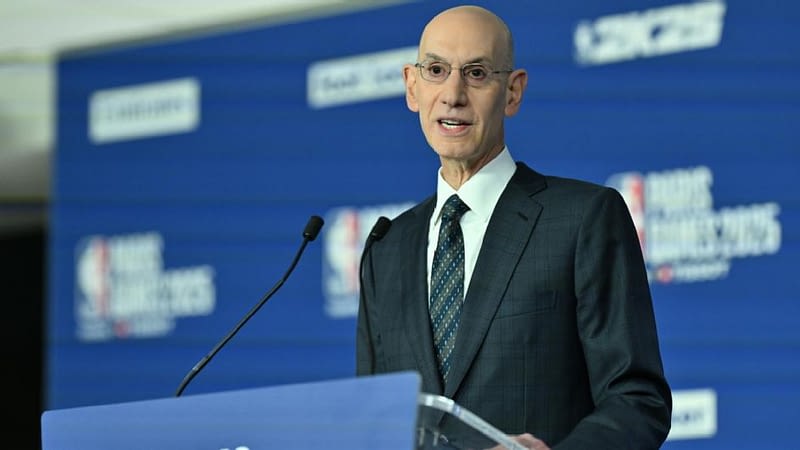The NBA’s Ambitious Plans for a European League: What You Need to Know
Imagine a world where the NBA isn’t just a North American phenomenon but a global powerhouse with its own league in Europe and possibly the Middle East. That’s the vision the NBA is seriously considering, and it’s a move that could redefine the landscape of professional basketball. Let’s dive into the details of this potential game-changer and explore what it could mean for the future of the sport.
First things first, this proposed league would be a standalone entity, not an expansion of the current NBA. The teams in this new league would compete against each other, not against existing NBA teams. It’s important to note that this idea is still in its early stages, and while the league is pushing for it, nothing is set in stone yet. Additionally, this European venture is separate from the international basketball league being advised by Maverick Carter.
Why is the NBA Considering a League in Europe?
The NBA sees a significant untapped financial opportunity in the European market for professional basketball. NBA Commissioner Adam Silver highlighted this potential during a recent visit to Paris, stating, “The commercial opportunity has not kept pace with the growth of the game.” The league believes that by leveraging their expertise in media rights deals, which are currently underwhelming for top European teams, they can create a viable enterprise. Additionally, they are confident in their ability to attract foreign investment.
What Foreign Investment?
The NBA is eyeing investment from both the United States and the Middle East. Sources indicate that the league has already reached out to current team owners and limited partners, who have shown interest in buying into new teams. For wealthy Americans and hedge funds, investing in an NBA product in attractive European cities presents an intriguing opportunity. With limited availability to buy into NBA teams and limited involvement in operations, this new venture offers a fresh frontier.
Meanwhile, sovereign funds in the Middle East are increasingly interested in European basketball as a way to introduce major team sports to the region. Dubai is actively pursuing a EuroLeague franchise, and Abu Dhabi has secured the rights to this year’s EuroLeague Final Four. Although Middle Eastern funds currently have limited access to the NBA, restricted to passive stakes of no higher than 20%, they could become major partners in a new NBA Europe, potentially even hosting franchises. The United Arab Emirates, with its world-class airlines, has already offered to alleviate travel costs for teams visiting its cities. Qatar, which will host the 2027 FIBA World Cup and already owns 5% of the Washington Wizards, also has its own airline.
What European Cities are Being Considered?
The NBA could follow a model similar to when it launched the G League 20 years ago, targeting cities with existing teams in the Continental Basketball Association. They could offer membership to long-standing EuroLeague teams, which include 16 permanent members and several temporary ones. This could set the stage for a high-stakes battle between the NBA and EuroLeague. However, the NBA is also exploring large European markets where basketball hasn’t traditionally been popular.
For instance, London currently has the London Lions, a team that faced legal and financial issues last year, resulting in their expulsion from the EuroCup. The team was later sold under duress. Paris Basketball, founded in 2018, is a promising team in the French capital, led by David Kahn, the former Minnesota Timberwolves general manager. However, it’s worth noting that Paris Basket’s entire budget for this season is just 19 million Euros, roughly equivalent to what the Indiana Pacers are paying Myles Turner this season. AS Monaco boasts a budget of over 29 million Euros, the highest in the French league, where financial transparency is required. Despite being in major markets, these operations are minor league compared to the NBA. The league sees great potential in these cities and in Germany, where basketball’s popularity is on the rise. Germany is the current world champion, having won the 2023 FIBA World Cup.
One idea the NBA has explored is partnering with major soccer clubs in cities like Manchester, U.K., to establish expansion teams under the soccer clubs’ umbrellas. Real Madrid, FC Barcelona, and Bayern Munich are soccer powerhouses that already have basketball teams in the EuroLeague.
What’s the Timetable?
The working idea is to launch the league by the start of the 2026-27 season at the earliest.
How Does This Affect the NBA Itself? Could These New Teams Play NBA Teams?
The impact on the NBA itself would be minimal. The NBA launched the Basketball Africa League (BAL) in 2019, recruiting existing teams and creating expansion teams, and that league operates independently of the NBA. The teams don’t compete against each other, and there’s no player sharing between the leagues. While exhibition games between Euro NBA teams and NBA teams are possible, and the NBA could play more regular-season games in Europe to generate attention, there would be a significant difference in stature and financial backing between the leagues.
Could teams from these leagues eventually compete in an international tournament? It’s a possibility, but not a viable option at the moment.
What about NBA expansion in Las Vegas and Seattle? In theory, this European venture doesn’t affect it. The NBA is still studying the idea, which can proceed independently of the European plans. However, practically speaking, this is slowing down the timetable for stateside expansion. Commissioner Silver has repeatedly delayed expansion discussions, and he and his top executives are heavily involved in the European enterprise. There’s a belief within the league that Silver would wait until after the Boston Celtics’ sale, which is expected to set a new record for franchise prices, before initiating an NBA expansion process. However, the Celtics’ sale is progressing slowly, and expansion isn’t moving forward at the moment.
What Would Stop NBA Europe from Happening?
The current NBA team owners could be a significant roadblock. There are still many questions from the board of governors about this concept after an initial round of briefings, according to one source. The BAL and the G League, the last two leagues the NBA founded, are not profitable. The WNBA is only now, after nearly 30 years, starting to show the potential for significant profitability. There’s a reason teams in major cities like London and Paris haven’t thrived; the interest in professional basketball hasn’t been strong enough. Owners might be concerned about another financial burden, which they would potentially have to subsidize, and they would need to vote for this to proceed. While NBA Europe is an enticing prospect, it’s far from a certainty.
Originally Written by: Brian Windhorst





















